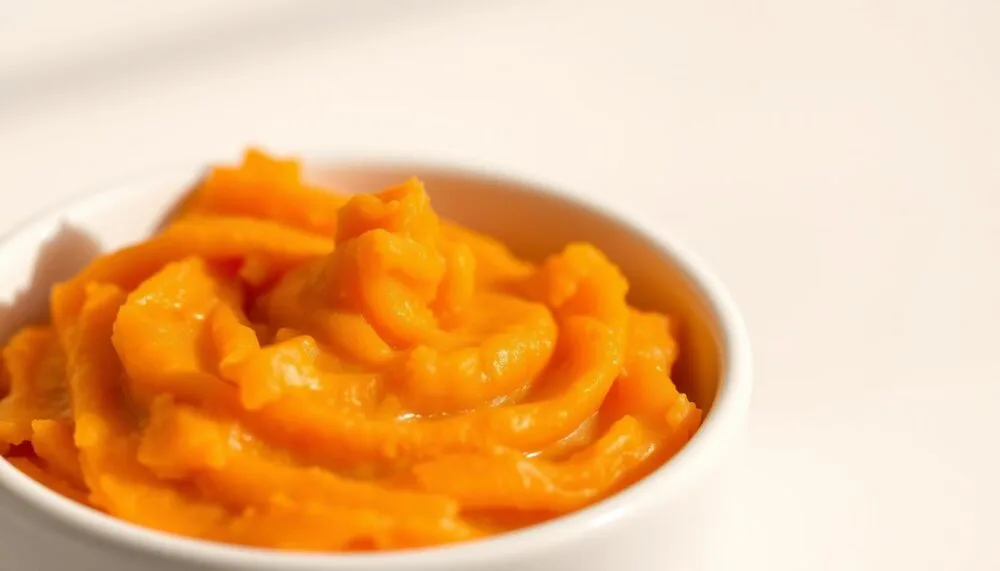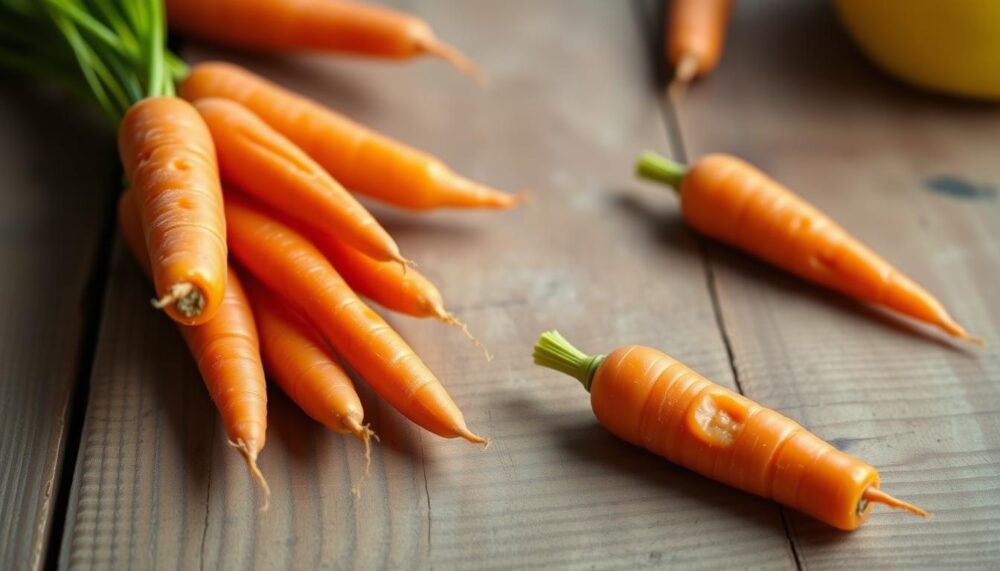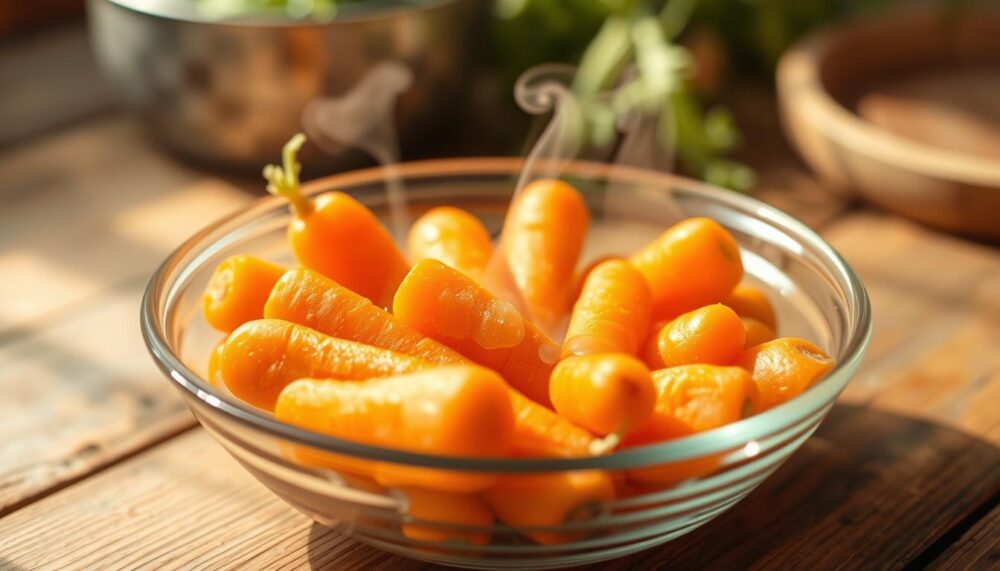
Learning to cook carrots for baby food is a great way to introduce your little one to a nutritious and delicious vegetable. Carrots are a popular ingredient in baby-friendly carrot recipes. Making an easy carrot puree for babies is simpler than you think. With the right guidance, you can create healthy and tasty meals for your baby.
Cooking carrots for baby food might seem daunting, but it’s actually quite straightforward. By following our step-by-step instructions, you’ll be able to make a variety of dishes. Our goal is to provide you with the knowledge and confidence to prepare how to cook carrots for baby food and other baby-friendly carrot recipes that your baby will love.
Introduction to Cooking Carrots for Baby Food
In this guide, we’ll cover everything you need to know about cooking carrots for baby food. We’ll talk about the benefits of carrots in a baby’s diet, selecting the right carrots, and different cooking methods. We’ll also provide you with tips and tricks for making easy carrot puree for babies and other baby-friendly carrot recipes.
Key Takeaways
- Carrots are a nutritious and delicious addition to baby food
- Cooking carrots for baby food is a simple process
- There are many different ways to prepare carrots for baby food, including steaming and roasting
- Carrots can be combined with other ingredients to make a variety of baby-friendly recipes
- Always prioritize your baby’s safety and health when preparing their food
- Consult with your pediatrician before introducing new foods to your baby’s diet
Benefits of Carrots in Your Baby’s Diet
Carrots are packed with nutrients that are great for babies. They are full of vitamin A, which is key for good vision, a strong immune system, and healthy skin. When you start introducing carrots to baby diet, think about how they boost health and growth. Carrots also have fiber, which helps with digestion and prevents constipation.
Adding healthy carrot baby food options to your baby’s diet can greatly improve their health and growth. Some main benefits of carrots in a baby’s diet are:
- Rich in vitamins and minerals
- Supports healthy vision and immune function
- Promotes digestive health and prevents constipation

As a parent, knowing when to introduce carrots is important. You can start adding carrots to your baby’s diet around 6 months old. They can be made soft and easy to digest in many ways. Carrots are a fantastic choice for a baby’s diet, offering lots of healthy carrot baby food options for you to try.
Selecting the Right Carrots for Baby Food
Choosing the right carrots is key for making homemade baby food carrots. You want fresh, organic carrots without pesticides. This ensures your baby gets the best nutrition and taste.
Look for carrots that are firm, straight, and bright orange. Steer clear of limp, bent, or damaged carrots. There are many types like Nantes, Imperator, or Danver, all good for baby food.

For best baby food carrot recipes, proper storage is vital. Keep carrots in a cool, dark spot, away from sunlight and moisture. Refrigeration also helps keep them fresh longer.
Here are some tips for picking and storing carrots for baby food:
- Choose carrots that are heavy for their size
- Avoid carrots with green tops, as they may be more bitter
- Store carrots in a breathable bag or container to maintain humidity
By following these tips, you can make tasty and healthy homemade baby food carrots. Always pick fresh, quality carrots. Try different best baby food carrot recipes to find your baby’s favorite.
Essential Tools and Equipment Needed
Making carrot baby food at home is easier with the right tools. You’ll need a steamer to cook carrots and keep their nutrients. A blender or food processor is key for making the carrots smooth.
For batch preparation, some optional tools can be helpful. You might want a large pot for boiling, a roasting pan for roasting carrots, and storage containers for the puree. It’s also important to have the right equipment.
Kitchen Tools Required
- Steamer
- Blender or food processor
- Large pot
- Roasting pan
- Storage containers
Having these tools is crucial for making carrot baby food safely and healthily. They help you create delicious and nutritious carrot puree for your baby.

Optional Equipment for Batch Preparation
Optional tools can make batch preparation easier, but they’re not necessary. A food mill can grind the carrots smoothly, and a sieve can remove lumps. Ice cube trays are great for freezing portions of the puree.
How to Cook Carrots for Baby Food: Step-by-Step Guide
Cooking carrots for baby food needs careful steps to ensure they are safe and ready. First, wash and peel the carrots. Then, chop them into small pieces. This makes them cook evenly and keeps them safe from choking.
There are many ways to cook carrots for baby food. Steaming is a top choice because it keeps the carrots’ nutrients and taste. To steam carrots, put them in a steamer basket over boiling water. Cover it with a lid and steam for 10-15 minutes, until they’re soft.
Here are the basic steps to follow:
- Wash and peel the carrots
- Chop the carrots into small pieces
- Steam the carrots for 10-15 minutes, or until tender
- Puree the carrots to the right consistency

By following these simple steps, you can make healthy and tasty carrot baby food. Always check the food’s temperature before serving. Also, store leftovers in the fridge or freezer for later.
Different Cooking Methods for Baby Food Carrots
There are many ways to cook carrots for baby food. Each method has its own good and bad points. The best way for your baby will depend on their needs and likes. We’ll talk about steaming, boiling, and roasting carrots for baby food. We’ll also give tips on picking the best method for your baby.
Some top healthy carrot baby food options are steamed, boiled, and roasted carrots. These methods help make tasty and healthy baby-friendly carrot recipes.
Steaming Carrots
Steaming carrots keeps their nutrients and taste. It’s also simple and needs little gear.
Boiling Method
Boiling carrots is fast and easy. But, it can lose nutrients if the carrots cook too long.
Roasting Technique
Roasting carrots makes them sweet and flavorful. It’s simple and great for making baby-friendly carrot recipes.
The best cooking method for your baby depends on their needs and likes. By picking a method that suits your baby, you can make many healthy carrot baby food options that taste good and are good for them.
Pureeing and Texture Guidelines by Age
Babies grow and their food needs change. The American Academy of Pediatrics suggests starting with single-ingredient purees like easy carrot puree for babies at 6 months. Using homemade baby food carrots helps keep the puree smooth and easy to digest.
When making homemade baby food carrots, think about your baby’s age. Younger babies need smooth purees. Older babies can handle thicker, chunkier textures. Here’s what to do:
- At 6 months, offer a single-ingredient puree, such as easy carrot puree for babies, with a smooth texture.
- At 8 months, introduce a slightly thicker texture, still using homemade baby food carrots as the main ingredient.
- At 10 months, babies can tolerate a chunkier texture, making it an excellent time to introduce a variety of flavors and ingredients to their diet.
Always check with your pediatrician before adding new foods or textures. By following these guidelines and using homemade baby food carrots to make easy carrot puree for babies, you can help your baby grow and develop.
Storage and Preservation Tips
After making carrot baby food at home, it’s key to store it right. This keeps its nutrients and safety intact. Follow guidelines for fridge, freezer, and spoilage signs to keep it fresh and healthy.
First, check for spoilage before storing. Look for odd smells, slimy feel, or mold. If you see these, throw it out. For fridge storage, use airtight containers and keep it at 40°F (4°C) or below.
- Refrigerate your carrot baby food within two hours of making it.
- Use airtight containers to prevent contamination and spoilage.
- Label and date your containers so you can easily keep track of how long they’ve been stored.
- Freeze your carrot baby food if you don’t plan to use it within three to five days.
By following these tips, your carrot baby food stays safe and nutritious. Always put your baby’s health first when making carrot baby food at home.
Combining Carrots with Other Baby Foods
When you start adding carrots to your baby’s diet, mixing them with other foods is key. This way, you offer a variety of nutrients and tastes. It makes mealtime fun and nutritious for your little one.
Carrots pair well with sweet potatoes, green beans, and peas. You can serve these mixes as purees or mashed. For instance, a blend of cooked carrots and sweet potatoes is both tasty and healthy.
Compatible Vegetables
- Sweet potatoes: rich in vitamins and minerals
- Green beans: high in fiber and protein
- Peas: good source of vitamins and minerals
Fruit and Carrot Combinations
Apples and pears are great when mixed with carrots. These fruit-carrot mixes add new flavors and textures. They make mealtime exciting and fun for your baby.
Trying out different carrot mixes with other baby foods is a smart move. It helps your baby develop healthy eating habits from the start.
Common Mistakes to Avoid When Preparing Carrot Baby Food
Preparing carrot baby food can be tricky. It’s important to avoid common mistakes to keep your baby’s food safe and healthy. Learning how to cook carrots for baby food is key. Using recipes made for babies can also help a lot.
One big mistake is overcooking carrots. This can make them lose nutrients and become unappetizing. Another mistake is undercooking, which can make carrots hard for your baby to chew. Also, keeping food clean and safe is crucial to avoid contamination.
Here are some tips to help you avoid these mistakes:
- Use fresh and organic carrots whenever possible
- Wash and peel carrots well before cooking
- Cook carrots until they’re tender but still firm
- Store baby food in airtight containers and refrigerate or freeze right away
By following these tips, you can make tasty and healthy carrot baby food. Always put your baby’s health and safety first when making their food. If you’re unsure, talk to your pediatrician. With practice and patience, you’ll get better at making carrot baby food and give your baby a great start in life.
Addressing Allergies and Sensitivities
When making carrot baby food at home, it’s key to watch for allergies and sensitivities. Carrot allergies are rare but can happen. It’s important to know the signs and symptoms.
If your baby has a rash, itching, or digestive issues after eating carrots, see your pediatrician. They can help figure out what’s wrong and what to do next.
Some common signs of carrot allergies or sensitivities include:
- Rash or hives
- Itching or swelling
- Diarrhea or vomiting
- Abdominal cramps
If you see any of these signs, stop giving carrots to your baby. Then, talk to your pediatrician. They can guide you on what to do next. You can also try making easy carrot puree for babies with different ingredients to avoid allergic reactions.
Remember, making carrot baby food at home is a good way to ensure your baby gets the nutrients they need. But, always put their safety and health first. By knowing about allergies and sensitivities, you can prevent bad reactions and help your baby grow on a healthy diet.
Conclusion: Making Safe and Nutritious Carrot Baby Food at Home
Making carrot baby food at home is a great way to give your baby important vitamins and minerals. This article shows you how to make healthy carrot baby food options without preservatives. It’s perfect for your baby’s growth needs.
Choosing the freshest carrots is key. Use the right cooking methods and watch the texture and temperature. This ensures your baby is safe and happy. Soon, you’ll make tasty carrot purees and mashes that your child will love.
Enjoy making homemade baby food. Carrots are sweet and colorful, great for your baby’s health. Bon appétit!
FAQ
What are the benefits of carrots in a baby’s diet?
Carrots are packed with vitamin A, which is key for healthy vision and immune function. They also have fiber, helping with digestion and preventing constipation. Carrots support brain function and promote healthy growth in babies.
When is the best time to introduce carrots to a baby’s diet?
The American Academy of Pediatrics suggests introducing carrot puree at 6 months. This is when babies start solid foods and can try new tastes and textures.
How do I select the right carrots for baby food?
Choose fresh, organic carrots for baby food. They should be firm, bright orange, and without blemishes or soft spots.
What tools and equipment do I need to make carrot baby food at home?
You’ll need a steamer, blender or food processor, and storage containers. Optional tools like a batch cooking system or high-powered blender can help. Make sure all equipment is clean before use.
What are the different methods for cooking carrots for baby food?
You can steam, boil, or roast carrots for baby food. Each method has its own benefits and drawbacks. Choose the best one for your baby’s needs.
How do I determine the right texture and consistency for my baby’s age?
As babies grow, their food needs change. Start with single-ingredient purees at 6 months. Then, introduce more complex textures and combinations as they get older.
How should I store and preserve carrot baby food?
Refrigerate carrot puree for up to 3 days. Freeze it for up to 3 months. Always check for spoilage before serving.
Can I combine carrots with other baby foods?
Yes, you can mix carrots with other foods for more nutrients and flavors. Try them with sweet potatoes, peas, spinach, apples, pears, and prunes.
What are some common mistakes to avoid when preparing carrot baby food?
Avoid overcooking, undercooking, and contamination. Cook carrots right and sterilize all equipment to prevent illness.
How do I know if my baby has a carrot allergy?
Carrot allergies are rare but serious. Watch for rash, itching, and digestive issues. If you think your baby has an allergy, talk to your pediatrician.